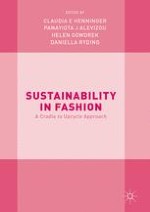2017 | OriginalPaper | Chapter
10. Social Sustainability in Apparel Supply Chains: Organizational Practices for Managing Sub-Contracted Homework
Authors : Archana, Marsha A. Dickson
Published in: Sustainability in Fashion
Publisher: Springer International Publishing
Activate our intelligent search to find suitable subject content or patents.
Select sections of text to find matching patents with Artificial Intelligence. powered by
Select sections of text to find additional relevant content using AI-assisted search. powered by
